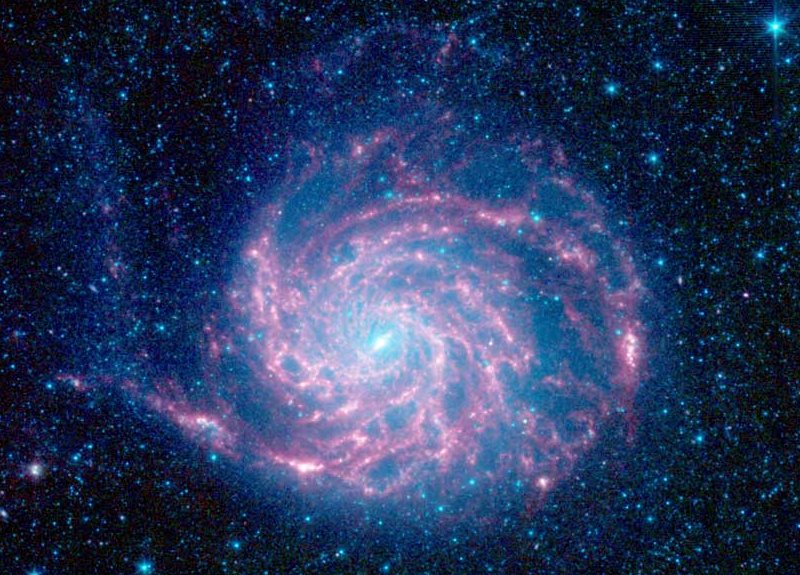
|
Explanation: Big, beautiful spiral galaxy M101 is one of the last entries in Charles Messier's famous catalog, but definitely not one of the least. About 170,000 light-years across, this galaxy is enormous, almost twice the size of our own Milky Way Galaxy. M101 was also one of the original spiral nebulae observed by Lord Rosse's large 19th century telescope, the Leviathan of Parsontown. Recorded at infrared wavelengths by the Spitzer Space telescope, this 21st century view shows starlight in blue hues while the galaxy's dust clouds are in red. Examining the dust features in the outer rim of the galaxy, astronomers have found that organic molecules present throughout the rest of M101 are lacking. The organic molecules tracked by Spitzer's instruments are called polycyclic aromatic hydrocarbons (PAHs). Of course, PAHs are common components of dust in the Milky Way and on planet Earth are found in soot. PAHs are likely destroyed near the outer edges of M101 by energetic radiation in intense star forming regions. Also known as the Pinwheel Galaxy, M101 lies within the boundaries of the northern constellation Ursa Major, about 25 million light-years away.
|
January February March April May June July August September October November December |
| ||||||||||||||||||||||||||||||||||||||||||||||||
NASA Web Site Statements, Warnings, and Disclaimers
NASA Official: Jay Norris. Specific rights apply.
A service of: LHEA at NASA / GSFC
& Michigan Tech. U.
Based on Astronomy Picture
Of the Day
Publications with keywords: M 101 - spiral galaxy - infrared
Publications with words: M 101 - spiral galaxy - infrared
See also:
- APOD: 2026 February 4 Á Spiral Galaxy NGC 1512: Wide Field
- Barred Spiral Galaxy NGC 1365 from Webb
- APOD: 2026 January 18 Á Jupiter from the Webb Space Telescope
- APOD: 2026 January 14 Á M51: The Whirlpool Galaxy
- IC 342: Hidden Galaxy in Camelopardalis
- NGC 253: Dusty Island Universe
- APOD: 2025 November 5 Á Spiral Galaxy NGC 3370 from Hubble
